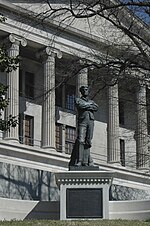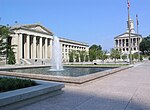Tennessee State Library and Archives
1854 establishments in TennesseeBuildings and structures in Nashville, TennesseeEducation in Nashville, TennesseeGovernment agencies established in 1854Libraries in Tennessee ... and 7 more
Libraries on the National Register of Historic Places in TennesseeLibrary buildings completed in 1953National Register of Historic Places in Nashville, TennesseeNeoclassical architecture in TennesseeState agencies of TennesseeState archives of the United StatesState libraries of the United States

The Tennessee State Library and Archives (TSLA), established in 1854, currently operates as a unit of the Tennessee Department of State. According to the Tennessee Blue Book, the Library and Archives "collects and preserves books and records of historical, documentary and reference value, and encourages and promotes library development throughout the state." This mandate can be found in Tennessee Code Annotated, Title 10, Chapters 1-8. Although most states operate their libraries and archives as separate agencies, Tennessee is one of a handful of states whose library and archives are administered jointly.
Excerpt from the Wikipedia article Tennessee State Library and Archives (License: CC BY-SA 3.0, Authors, Images).Tennessee State Library and Archives
7th Avenue North, Nashville-Davidson
Geographical coordinates (GPS) Address External links Nearby Places Show on map
Geographical coordinates (GPS)
| Latitude | Longitude |
|---|---|
| N 36.165555555556 ° | E -86.785277777778 ° |
Address
Tennessee State Library and Archives
7th Avenue North
37203 Nashville-Davidson
Tennessee, United States
Open on Google Maps








